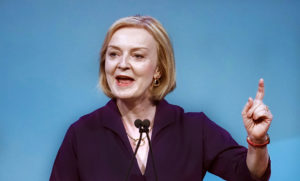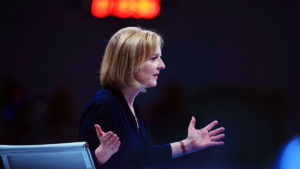Faced with soaring costs of living, increased collateral damage from the war in Ukraine, and widening national inequality, Liz Truss seemed curiously optimistic in her first speech as Prime Minister. What could possibly be driving such bullishness? Absent any sign of a coherent plan of action, we might find her motivation in an Instagram post from 2018, where Truss cited the time she spent in Canada as a teenager as “the year that changed my outlook on life…..#pioneercounty #optimism #maplespirit”.
As profound an impact as that year might have had on Truss’s optimistic psyche, she would do well to look more closely at Canada’s faltering “success story” in recent years. Today, the country is no longer the land of milk and honey (even if it does still produce a fair amount of maple syrup), but suffers many of the same problems as the UK, and a number that are significantly worse: rising inflation, profound income inequality, the challenges posed by climate change, and an increasing host of social problems — not least the mass stabbing spree last weekend in Saskatchewan that left 10 people dead.
However, to the extent that the Trudeau Administration has attempted to remedy some of these problems, there are clear lessons for Truss. Unlike in the UK, many of Canada’s energy problems are largely self-inflicted, a result of a progressive government ignoring its comparatively resource-rich environment, even as its European allies (including the UK) suffer severe consequences of being cut off from Russian gas supplies and the corresponding rise in energy prices.
A few weeks ago, German Chancellor Olaf Scholz visited Canada to secure more gas for his country. This being Canada, the German Chancellor was treated politely, but the underlying plea for Ottawa to increase liquefied natural gas (LNG) production to offset the loss of Russian gas was given short shrift. The Canadian government, one of the biggest producers of natural gas in the world, has misgivings about whether becoming an even bigger producer and exporter would actually be profitable.
Leaving aside the broader debate as to whether the dangers of man-made climate change have been confounded with natural weather and climate variability, natural gas, although a fossil fuel, emits roughly half the amount of carbon dioxide when combusted in a new, efficient natural gas power plant. This would suggest that Canada’s absolutist stance is not only a major geopolitical mistake, but also an economic own goal. The country is foregoing a major growth opportunity, which would both alleviate global inflationary pressures by increasing the supply of natural gas to the global markets, while simultaneously enhancing the prospect for a plethora of new high-paying jobs that would buttress Canada’s declining middle class.
Canada is also home to substantial supplies of copper, nickel, lithium, and cobalt — all of which will be essential to producing the infrastructure required to transition from fossil fuels to greener sources of energy, such as wind and solar. But mining itself remains a “brown” industry, one that creates substantial carbon emissions and environmental degradation. It seems conceivable, then, that the Trudeau government’s green energy purity could soon discourage the increased mining activity needed to facilitate this energy transition.
Elsewhere, the Canadian government is following in the footsteps of the US, offering incentives for greater use of electric vehicles (EVs), even though rushing to replace gasoline-powered cars will hand the keys of the North American transportation sector to China, given Beijing’s near-monopoly on rare-earth elements such as neodymium and dysprosium, which are used in the high-output motors of most electric vehicles. EVs also risk overtaxing our power grids with their ongoing charging demands.
Given the Truss government’s anticipated hardline against Russia and China, one hopes that the new British Prime Minister will not fall into the same trap. And the next few months in Canada could signal how this might be achieved. Like its British counterpart, Canada’s Conservatives will have a new leader next week. Regardless of whether the party membership chooses Pierre Poilievre (the current favourite) or Jean Charest, both leaders have a markedly different approach to Trudeau on climate change policy.
Both Poilievre and Charest are standing on platforms that feature an aggressive agenda to increase Canada’s oil and gas production and exports, notably by accelerating the major energy infrastructure projects the Tories deem to be in the national interest. This would likely include approving the resurrection of a major LNG plant in Quebec’s Saguenay region — a project that has been rejected by both the current federal and provincial governments, but would enhance Canada’s position as a major LNG supplier to Europe to offset the loss of Russian gas. Both leadership candidates have also committed to covering the cost of any litigation that came the way of those promoting such undertakings. There are already indications that a future Truss government will echo her Canadian Tory counterparts: she is more amenable towards increasing North Sea oil and gas production, and evinces less enthusiasm than Boris Johnson for Net Zero by 2050.
Outside of energy policy, there is also the question of regional inequality. While Truss has paid lip service to the importance of “levelling up”, the early signs suggest that she is not embracing the question of regional economic disparity with the same kind of enthusiasm as Boris Johnson. Here, too, Truss could take note from Canada, notably by examining the latter’s equalisation payments system, which was first introduced back in the Fifties as a formal way to transfer funds from the federal government to the provinces so that each region could provide “reasonably” comparable services at “reasonably” comparable rates of taxation.
The rationale behind the programme is to ensure that all Canadians, regardless of where they live, have provincial governments capable of delivering comparable social services, such as healthcare or welfare services. To do this, a formula measures each province’s “fiscal capacity”, and equalisation payments then bring poor provinces up to some average level. Replicating a scaled-down version of this programme in the UK might work well for Truss, especially in terms of holding on to the Tory Party’s gains in its “Red Wall” regions, Equalisation programmes would “level up” depressed regions in the Midlands and the North far more effectively than large, wasteful infrastructure projects, such as HS2.
Yet in many respects, Canada’s problems are more easily resolved, given that so many are self-inflicted. And not only are there ample natural resources to offset the current energy crisis, but also broad institutional mechanisms to alleviate regional inequalities. Canada, then, cannot provide all the solutions that Truss needs. For all her boosterism, Britain remains a country fatigued by her party’s ongoing political churn and the non-stop travails still emanating from Brexit. If she is to succeed, Trust must begin by removing her rose-tinted view of Canada. The Great White North can certainly serve as an inspiration — but that is all. Canada may have changed Truss’s “outlook on life”. But if Britain is to “ride out the storm”, as she suggested yesterday, an entirely new approach is needed.
Disclaimer
Some of the posts we share are controversial and we do not necessarily agree with them in the whole extend. Sometimes we agree with the content or part of it but we do not agree with the narration or language. Nevertheless we find them somehow interesting, valuable and/or informative or we share them, because we strongly believe in freedom of speech, free press and journalism. We strongly encourage you to have a critical approach to all the content, do your own research and analysis to build your own opinion.
We would be glad to have your feedback.
Source: UnHerd Read the original article here: https://unherd.com/




